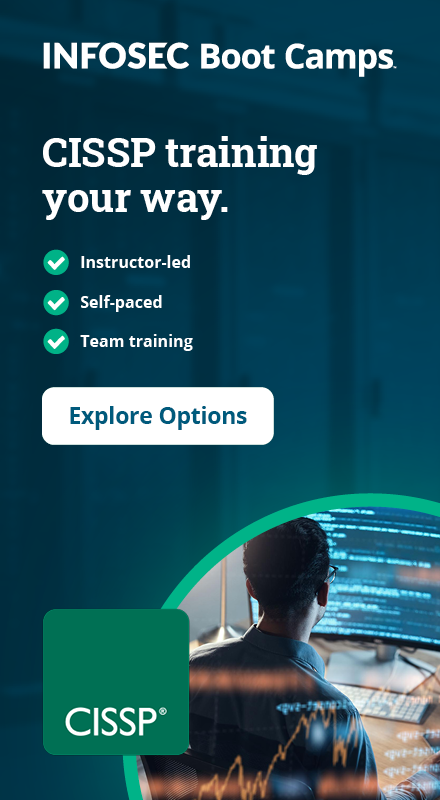CISSP certification salary: A comprehensive 2025 salary guide
The demand for skilled cybersecurity professionals, particularly those holding the Certified Information Systems Security Professional (CISSP) certification, remains strong. Much has been written about the cybersecurity skills gap, but one overlooked factor is that many of the jobs required to fill that gap are not entry-level but mid-level and beyond.
That's one of the reasons the CISSP is currently the most sought-after cybersecurity certification by employers, according to Cyberseek. It is also the most popular certification for mid and senior-level cybersecurity professionals, with over 160,000 holders. It validates expertise in eight core domains of cybersecurity, as well as on-the-job experience.
This guide aims to provide an overview of CISSP salaries. We'll explore the average salaries, examine factors influencing individual earnings and analyze available job opportunities. We'll also discuss alternative certifications and offer guidance for those pursuing the CISSP credential.
Earn your CISSP, guaranteed!

If you want the average CISSP pay with bonuses, the answer is $175,583, but the salary of CISSP holders varies quite a bit so the context provided below is important. Also, if you want to see how the CISSP compares to other popular certifications, I recommend downloading our free Cybersecurity Salary ebook.
Lastly, if you're preparing for your CISSP, we created a free, one-hour CISSP exam tips course and ebook with an instructor whose students have a 95% pass rate.
Understanding CISSP job roles
We will get to the intricacies of CISSP salaries, but first, let's look at the wide variety of skills this certification covers and what type of roles typical CISSP holders fill.
The CISSP curriculum, which was last updated in April 2024, encompasses eight domains of knowledge:
- Security and risk management: Identifying and mitigating security risks within an organization.
- Asset security: Protecting valuable assets like data, systems and devices.
- Security architecture and engineering: Designing secure networks and systems.
- Communication and network security: Implementing controls to secure communication channels and networks.
- Identity and access management (IAM): Managing user access to systems and data.
- Security assessment and testing: Identifying and evaluating vulnerabilities and systems and networks.
- Security operations: Monitoring and responding to security incidents.
- Software development security: Integrating security practices into the software development lifecycle.
Infosec Skills Author Cicero Chimbanda discusses the role of a cybersecurity manager and the qualifications needed in this episode of the Cyber Work Podcast.
The CISSP covers such a diverse set of knowledge that it applies to various technical and managerial positions. A few common job titles include:
- Cybersecurity manager: Oversee the organization's cybersecurity strategy and operations, manage teams and implement security controls.
- Cybersecurity engineer: Design, implement and maintain secure IT infrastructures and systems.
- Cybersecurity architect: Design and build secure IT architectures aligned with organizational needs.
- Cybersecurity consultant: Advise clients on cybersecurity best practices, assess vulnerabilities and develop mitigation strategies.
Earn your CISSP, guaranteed!

What is the average CISSP salary?
Defining a single, definitive "CISSP average salary" can be tricky due to the diverse factors at play. However, by compiling data from multiple credible sources, we can provide realistic numbers to give you an idea of the salary potential. Here are the sources we used to calculate the average total pay for CISSP holders.
- Payscale: The site provides only a base salary number for CISSP holders of $129,000.
- Glassdoor: The site doesn't have much data on CISSP holders specifically, but the average base salary of an information security manager is $146,414, with $50,473 in additional compensation.
- Salary.com: Again, we used information security manager and found a base salary of $155,709 and additional compensation of $13,278.
Based on the data gathered from these sites, we can confidently say that the average Certified Information System Security Professional salary is $143,708, which rises to $175,583 for average total compensation. However, that is considering just one common job role of CISSP holders, and even within that singular job role, the CISSP salaries can vary greatly based on factors such as location, experience, industry and more.
How job role affects CISSP salary
Perhaps the biggest factor that impacts your CISSP salary is your job role. Take a look at some of the average base salaries based on Payscale data:
- Chief information security manager: 188,079
- Information technology director: $ 137,678
- Information Security Manager: $133,687
- Cybersecurity engineer: $120,201
- Cybersecurity analyst: $103,197
How experience affects CISSP salary
As you progress in your career and learn more valuable skills, your earning potential will naturally increase. The data below from Salary.com demonstrates the CISSP base salary increase with experience (using the information security manager role):
- Entry-level information security manager: $148,787
- Intermediate-level information security manager: $149,394
- Senior-level information security manager: $150,405
- Specialist-level information security manager: $152,833
- Expert-level information security manager: $158,299
How location and industry affect salary
Where you live, and the industry you work in also play a part in your CISSP salary. Salary.com reports higher CISSP salaries in top cybersecurity markets like San Jose and New York City. Here are some salaries in various states using the information security manager role:
- California: $171,747
- New York: $165,986
- Maryland: $160,536
- Colorado: $158,823
- Pennsylvania: $155,398
- Florida: $147,924
- Alabama: $143,097
Industry can also influence your earnings. Here are some average salaries of CISSP holders by industry (without specifying role) courtesy of Glassdoor:
- Information technology: $226,430
- Financial services: $183,740
- Management and consulting: $160,699
- Healthcare: $147,301
- Government and public administration: $128,603
ISSAP, ISSEP and ISSMP salaries
Previously, the CISSP had advanced specializations or concentrations you could earn after you earned your CISSP, but in October 2023, ISC2 separated these certifications into standalone certs:
- ISSMP: Focuses on management best practices, ideal for aspiring or current information and security leaders.
- ISSEP: Geared towards security engineers, it covers secure network engineering and architecture.
- ISSAP: Designed for security architects, providing in-depth knowledge of secure architecture design and implementation.
CISSP-ISSAP is now just ISSAP, CISSP-ISSEP is ISSEP, and CISSP-ISSMP is ISSMP.
In this article, we won't break down the salary of each of those certifications. But since they are considered a step beyond the CISSP in terms of knowledge and experience, earning them can definitely help increase your salary potential for those related roles.
CISSP demand and career opportunities
The future of cybersecurity is bright. According to the ISC2 Cybersecurity Workforce Study, the global cybersecurity workforce gap rose 19.1% year over year to hit more than 4.7 million in 2024. More than 542,000 of those workers are needed in North America to adequately secure organizations.
The good news? The CISSP certification positions you at the forefront of this field. What sets the CISSP apart is that it equips you with a broad base of knowledge that opens doors to diverse and exciting possibilities, including:
- Get more technical: Dive deep into the intricacies of secure infrastructure, threat detection, and incident response, becoming a vital force in building robust defenses. (e.g., security analyst, security engineer)
- Become a leader: Ascend to leadership roles like security program manager or CISO, guiding an organization's cybersecurity strategy, ensuring compliance and fostering a culture of security awareness.
- Embrace variety: Thrive in the dynamic world of consulting, advising clients on best practices, assessing vulnerabilities and developing tailored security solutions across diverse industries.
Or you can seek even deeper specialization. As noted above, ISC2 offers additional certifications that complement the CISSP: ISSAP, ISSEP and ISSMP
CISSP certification trends and alternatives
As we outline in our cybersecurity certification roadmap, there are many options for mid-level cybersecurity professionals as they advance in their careers. While the CISSP excels in its breath, there are alternative certifications that cater to specific areas of expertise:
- For governance, audit, and risk: Certifications offered by ISACA, such as CISA (Certified Information Systems Auditor and CRISC (Certified in Risk and Information Systems Control), dive deeper into these critical parts of cybersecurity.
- For privacy expertise: The International Association of Privacy Professionals (IAPP) offers certifications like CIPT (Certified Information Privacy Technologist) and CIPP (Certified Information Privacy Professional) to equip you with knowledge of data privacy regulations and best practices.
- For cloud security mastery: Certifications like AWS Certified Security Specialist, Microsoft's Azure Security Engineer Associate or ISC2's own CCSP (Certified Cloud Security Professional) provide focused training in securing cloud environments.
Remember, the CISSP is often considered a mid-career certification. Your learning journey doesn't stop there. These alternative certifications, along with continuous learning and upskilling, allow you to specialize in specific domains or pivot into new areas within the vast cybersecurity field.
Preparing for your CISSP exam
The CISSP is a three-hour test. It’s an adaptive test, so the number of questions you get depends on how you’ve done on earlier questions, as Steve Spearman explains in this episode of Cyber Work Hacks.
You may be inspired by the possibilities the CISSP unlocks and eager to start on your certification journey. Before you begin, here is a breakdown of the key steps to certification:
Meeting the CISSP requirements
The CISSP certification has specific prerequisites. You'll need a minimum of five years of cumulative paid work experience in two or more of the eight domains covered by the CISSP exam. Alternatively, you can combine four years of experience with a relevant college degree or an approved ISC2 credential to meet the requirement.
Resources that will help you prepare
Once you confirm eligibility, the following resources are available to help you master the CISSP domains:
- Live boot camps: Learn everything you need to pass the CISSP exam in five days of intensive training with Infosec's CISSP Boot Camp.
- On-demand learning paths: Master the CISSP with Infosec's comprehensive CISSP Learning Path and learn at your own pace with structured online lessons, practice exams and other resources.
- Study groups and communities: Connect with other CISSP aspirants for peer support, knowledge sharing, and motivation at communities like TechExam's CISSP forum.
Also, don't forget to download our free CISSP exam tips ebook for valuable insights and strategies to approach the exam with confidence, and visit our comprehensive CISSP hub to access in-depth information about the exam format, domains covered and more tips for exam and career success.
Free CISSP one-hour prep course and ebook!
Get proven exam tips from an instructor whose students have a 95% exam pass rate — plus a complimentary ebook!
Is CISSP certification worth the cost?
The decision to pursue the CISSP certification is a personal one, but the evidence speaks volumes. The investment of time and effort can be significant, but the potential return on investment is undeniable. Here's why:
- Demand and earning power: The CISSP consistently ranks at the top of job postings, which translates to a higher earning potential. The average salary for CISSP holders working as an information security manager is currently $175,583.
- Career advancement: The CISSP opens doors to diverse and exciting career paths, from technical roles like security engineer to leadership positions like CISO.
- Skills for the future: The 2024 update to the CISSP demonstrates its commitment to keeping you relevant and prepared for emerging threats.
Take your first step to CISSP certification today by exploring the resources provided here and charting your learning path. A future in cybersecurity is a bright one, and with the CISSP by your side, you'll be well-positioned to seize its potential and contribute to a safer digital world.






